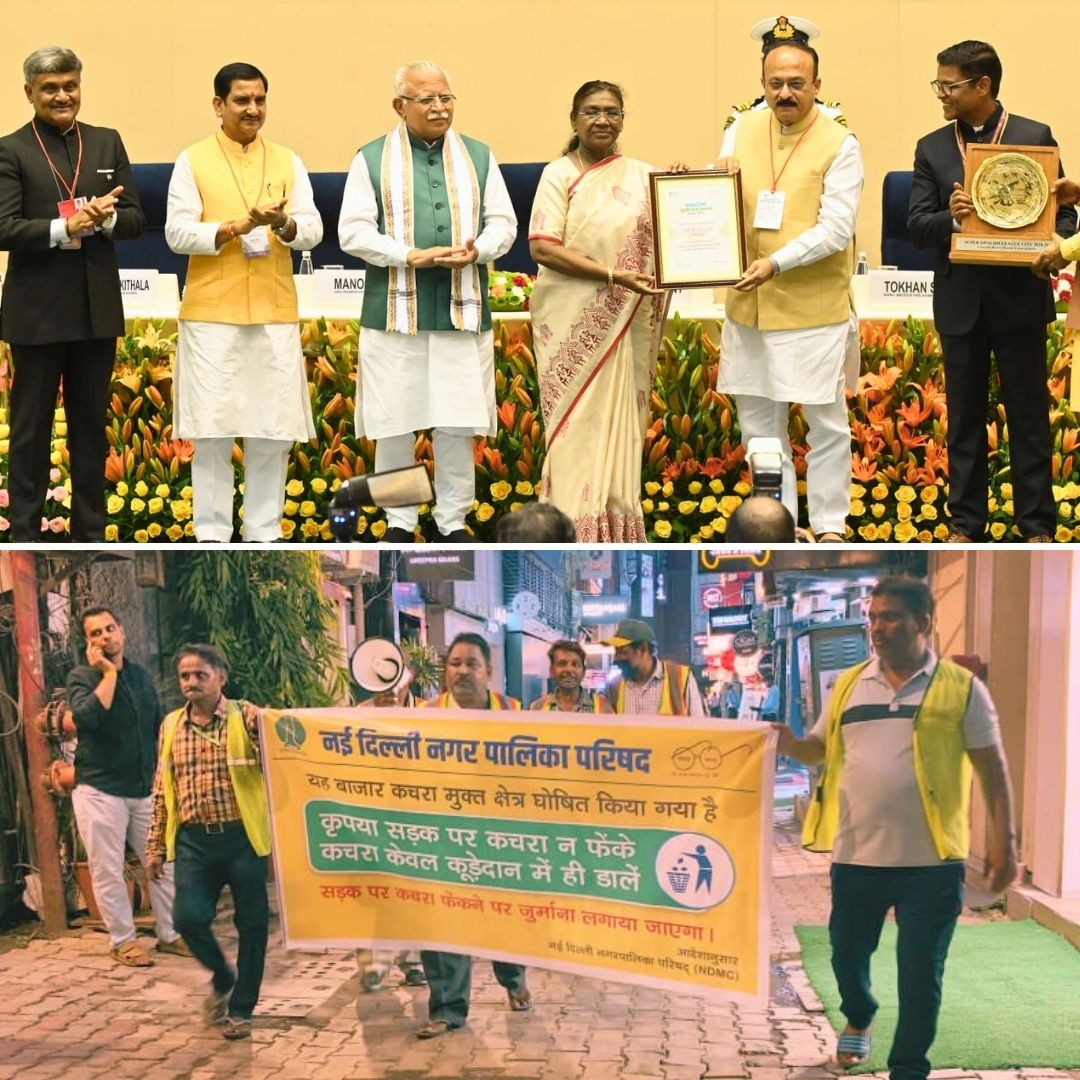The New Delhi Municipal Council (NDMC) has received the ‘Super Swachh League City Award’ at the Swachh Survekshan 2024-25, recognising its outstanding commitment to sanitation, waste management, and green initiatives in the 50,000 to 3 lakh population category.
The award was presented by President Droupadi Murmu and Union Minister Manohar Lal Khattar during a ceremony in New Delhi on 11 June 2025. Meanwhile, the Municipal Corporation of Delhi (MCD) recorded significant progress by climbing to 31st place among 44 cities with over one million residents—an improvement from last year’s 90th position—but still faces substantial challenges on several important cleanliness indicators.
NDMC: Setting New Benchmarks in Urban Cleanliness
The NDMC’s achievement reflects a sustained and holistic approach to urban sanitation. Officials cited several factors behind their success, including 99% efficiency in door-to-door waste collection, 87% source-level waste segregation, and a 100% cleanliness status for all public toilets within its purview.
NDMC Chairman Keshav Chandra lauded the efforts of all employees, particularly the Safai Sevaks, remarking, “This award is a testament to NDMC’s legacy of urban innovation and our staff’s tireless work.” Vice Chairman Kuljeet Singh Chahal credited both residents and visitors, noting that “in a city with such a transient population, every citizen’s participation is vital to maintaining high standards.”
The NDMC also highlighted ongoing public campaigns and infrastructure investments tailored to both ease of access for citizens and environmental sustainability, such as electronic waste kiosks and rooftop solar projects.
MCD: Progress Amidst Complex Challenges
Simultaneously, the MCD’s steady improvement signals growing momentum towards better citywide hygiene, yet it also exposes areas needing urgent attention. Though the MCD scored full marks for door-to-door waste collection and cleanliness at major markets, the overall segregation of solid waste at source stood at just 56%, while waste processing was at 51%.
Only 27% cleanliness was achieved with respect to local water bodies, and public toilets received a 63% cleanliness rating—underlining persistent gaps in services. MCD Commissioner Ashwini Kumar remarked, “While operational improvements and better technology have helped, community awareness and behavioural changes are crucial to sustaining progress.”
With over 11 million people under its jurisdiction, rapid population growth and informal settlements continue to strain resources, making citizen participation and innovation essential for further improvement.
Background: Swachh Survekshan’s Wider Impact
The Swachh Survekshan, administered by the Ministry of Housing and Urban Affairs, is the world’s largest urban cleanliness survey, assessing more than 4,500 Indian cities in 2024-25. The rigorous evaluation tracked parameters like waste collection, processing, sanitation, citizen involvement, and outdoor cleanliness, with an expanded scoring system that rewards both quantitative achievements and quality of life improvements for residents.
This year’s survey also prioritised public engagement—nearly 13 crore (130 million) feedback responses influenced city scores, highlighting how cleanliness is not just a government duty but a people’s movement. For Delhi, NDMC’s latest recognition builds on its established track record of innovation, while the MCD’s upward trajectory demonstrates how ongoing reforms, technological investments, and sustained civic campaigns have begun paying dividends, even as challenges persist.
The Logical Indian’s Perspective
The NDMC’s well-deserved honour should inspire all urban stakeholders to pursue excellence with compassion, creativity, and diligence. At the same time, the MCD’s gains reflect the power of continuous improvement—showing that even complex, resource-stretched megacities can create cleaner, healthier environments if every citizen and official commits to positive change.
Issues of urban cleanliness closely impact public health, social inclusion, and environmental sustainability; they demand collective will and empathy from all.
🌟 A Shining Chapter in NDMC’s Legacy 🌟
— New Delhi Municipal Council Official (@tweetndmc) July 17, 2025
NDMC: Leading with Integrity, Excelling in Service
In a moment of national pride, the New Delhi Municipal Council (NDMC) was conferred the prestigious Swachh Survekshan Award 2024 by the Hon’ble President of India, Smt. Droupadi Murmu, pic.twitter.com/Mn76H1oint












